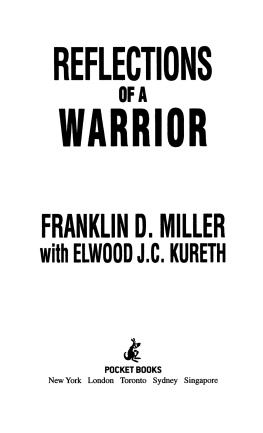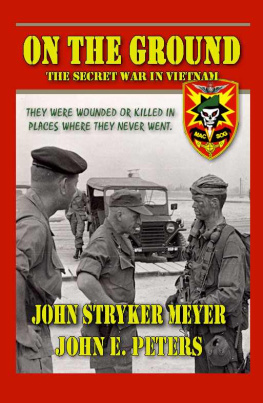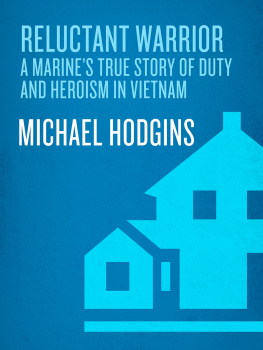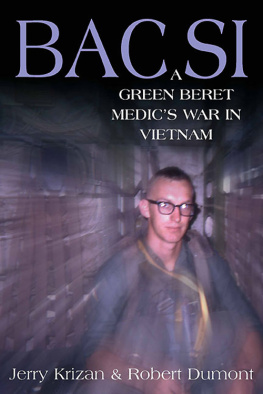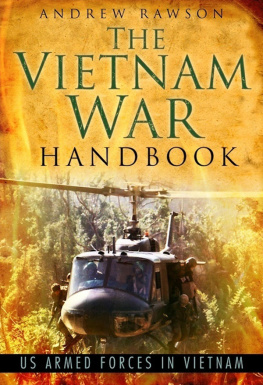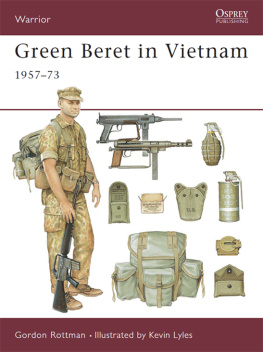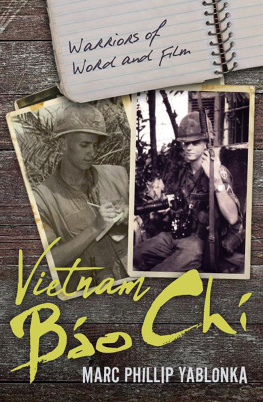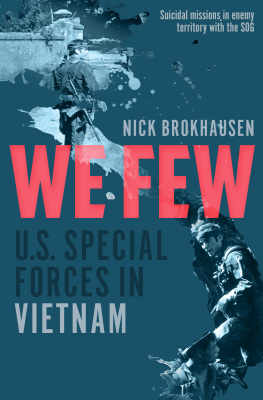Copyright 1991 by Franklin D. Miller and Elwood J.C. Kureth
Afterword copyright 2003 by Cindy Kureth
All rights reserved, including the right to reproduce this book or portions thereof in any form whatsoever.
For information address Pocket Books, 1230 Avenue of the Americas, New York, NY 10020
POCKET and colophon are registered trademarks of Simon & Schuster, Inc.
photo credits: Corbis, William A. Bake/Corbis
Preface
I was into the fifth day of a one-year tour in Seoul, South Korea, when I met the man my sponsor had spoken of in reverent tones. The words that entered my gray matter days before suddenly stepped forward, front and center, ready for inspection.
Medal of Honor.
He came strolling into our office that day, a big grin on his face as if hed just heard a joke. His manner was easy and his mood was light. Physically, he didnt measure up to the Hollywood version of a Medal of Honor recipient. That is to say, he didnt resemble Sylvester (Rambo) Stallone or Clint (Heartbreak Ridge) Eastwood. So I immediately consulted the Hollywood Medal of Honor Recipient Checklist:
Square, iron jaw? No.
Piercing, steely eyes? Not quite.
Ramrod-straight posture? Maybe in his younger days.
Broad-shouldered, tight-waisted, barrel-chested physique? Ahhh no.
Only one item left.
Hello, Captain Kureth. Welcome to DLOG.
I mentally checked the block in the negative column beside Deep, raspy, gravel voice. So much for stereotypes.
He extended his hand and I took it. Hmmmmm. Average handshake. No viselike grip or shoulder-wrenching arm pumping. And I noticed that he didnt exude an air of intensity or violence; in fact, he generated a very relaxed atmosphere.
He sat down, still smiling. I glanced at my watch, and when I looked upwhats this?where a second before had sat Sergeant Major Frank Miller now sat a laughing, wildly gesturing and articulating kid! A rather profane kid to be sure, who alternately laughed and swore as he recalled some of his experiences in the land sixteen hundred miles to the southwest of us. Everyone in the office halted their activities and went along for the ride as his boyish enthusiasm and adept storytelling skills placed us next to him in the dense, incredibly green vegetation of Vietnam.
His monologue lasted for about twenty minutes. Hed get up from his seat occasionally to emphasize a point with a particular body stance. No on interrupted him as he paused to collect his thoughts, ensuring an accurate, detailed, and living account of each situation. At the conclusion of the journey, our tour guide strolled out of the office as easily as he had come in.
That short interlude, combined with the stories my sponsor told me about Sergeant Major Miller, spawned a thousand burning questions that raced through my information-starved mind. When I finally collected and collated my thoughts, two questions stood above the rest.
My opening query was the one most people would probably ask first: What did he do to deserve the Medal of Honor? The next question, however, was perhaps far more intriguing than the previous one: What made him want to stay in Vietnam for six consecutive years (thats right, six years!) when most soldiers, from the moment they set foot in-country, lived for the day they took the freedom bird out of there? Why did he continue to extend year after year?
When you read Reflections of a Warrior you will discover that the answer to my Medal of Honor inquiry was simple, straightforward, and quite spectacular. The second question required a series of much more complex and thoughtful responses. Responses that might surprise you. Sergeant Major Miller explains throughout the book why he never wanted to leave Vietnam.
I was impressed by two facts, the first being Sergeant Major Millers ability to command an audience. His communication skills and personality allow him to interface effortlessly with people. Secondly, not all of his stories were about conflicts, or asskicks. Several accounts painted pictures of a beautiful land and truly interesting people. Some stories illustrated that humor can be found in the most unlikely places.
It didnt take long for me to realize this was one very interesting individual. His stories, I was positive, would be as fascinating to the general public as they were to the soldiers in the office that day. His background in the Special Forces, his six consecutive years in Vietnam, and his Medal of Honor meant that he spoke with the voice of authority. He was the genuine article, the real McCoy. Exactly what the public wants.
I approached him a few days later with the idea for this book. He readily embraced it. As it turned out, he had been wanting to pen his experiences for quite some time. He was told on numerous occasions that his story had tremendous market value. So my book idea was nothing new, except now I was there to assist him in this venture.
Right up front we had to make a decision. What was going to be the purpose of this book? Were we going to set the record straight about how it really was in Vietnam? Or would this book serve as a document to show how screwed up things were at the time? Horrors of war? Mans inhumanity toward his fellow man?
Fortunately, we were of the same mind regarding its contents and intent. We wanted this book to entertain the reader. Pure and simple. There was no record to set straight because each participant in the war had his or her own perspective and perception of the conflict. Its not possible to conclude that one persons version of the war is valid and anothers is not, simply because each version is the way it was for the person who lived it. Isnt that valid enough?
There would be no preaching. One persons virtues are another persons vices. We wouldnt draw profound conclusions or get into philosophical discussions. Wed leave those activities for the readers. Wed simply present bits and pieces of the Vietnam experience as one man saw it.
One point Sergeant Major Miller wanted to make clear was that even though this book may give the impression his life in Vietnam was constantly filled with excitement and danger, that was not the case. There were months on end when his unit walked around the country without seeing any sign of the enemy. In fact, there were long periods of time during his six years in Vietnam that were downright boring. However, he did have more than his share of fun as you will learn from reading this book. And when he did encounter exciting and dangerous situations they were, in a word, intense.
Perhaps youll also notice that the book skips around frequently. It begins in chronological order but soon starts jumping back and forth through the years. I could have organized the book into a straight chronological sequence, but I preferred to put Sergeant Major Millers experiences down on paper in the order he recalled them. By doing so I felt the book would take on a real storytelling quality. I believe weve accomplished that goal. And please remember that Reflections of a Warrior is written from Sergeant Major Millers point of view, so the Is in the following text refer to him.
Finally, weve kept the names of people, places, and units to a bare minimum. In many cases we couldnt give such information. Its just as well, because in Reflections of a Warrior the plays the thing.
Over the next several months we talked about everything from Kool-Aid and orange soda to major confrontations with Mr. Victor Charles. From the seemingly trivial to the incredibly significant. Its all here, and its quite a slice of life.

